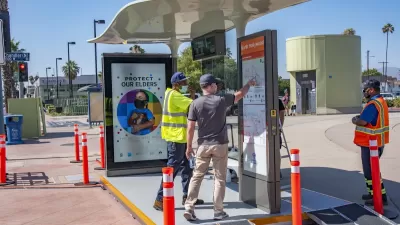Many U.S. transit agencies have policies allowing riders to request dropoffs between stops, but fail to publicize them to passengers and operators.

If you’ve ever wished you could ask your bus driver to let you off between stops, it turns out you probably can. According to an article in Next City by H. Jiahong Pan, many U.S. transit agencies have a “request stops” policy that allows riders to ask to disembark between designated stops “within reason.” Request stops can make travel safer and more accessible by letting people exit the bus closer to their destination or in places with better lighting or pedestrian infrastructure.
However, few riders, or even drivers, know about the policies, even though some date back as far as the early 1970s. “Although studies have shown the policy helps female riders who feel uncomfortable walking long distances at night alone, transit agencies struggle to get the word out and develop clear, consistent policies.”
While agencies are working to clarify these policies for operators and riders, some also ban request stops on rapid transit lines, saying that adding stops would increase travel times. Agencies also have a variety of rules for where drivers can drop off passengers, such as only stopping at corners before an intersection or banning dropoffs next to highways.
FULL STORY: An Obscure Rule About Bus Stops Can Make Riding At Night Safer

Planetizen Federal Action Tracker
A weekly monitor of how Trump’s orders and actions are impacting planners and planning in America.

Congressman Proposes Bill to Rename DC Metro “Trump Train”
The Make Autorail Great Again Act would withhold federal funding to the system until the Washington Metropolitan Area Transit Authority (WMATA), rebrands as the Washington Metropolitan Authority for Greater Access (WMAGA).

DARTSpace Platform Streamlines Dallas TOD Application Process
The Dallas transit agency hopes a shorter permitting timeline will boost transit-oriented development around rail stations.

Renters Now Outnumber Homeowners in Over 200 US Suburbs
High housing costs in city centers and the new-found flexibility offered by remote work are pushing more renters to suburban areas.

The Tiny, Adorable $7,000 Car Turning Japan Onto EVs
The single seat Mibot charges from a regular plug as quickly as an iPad, and is about half the price of an average EV.

Supreme Court Ruling in Pipeline Case Guts Federal Environmental Law
The decision limits the scope of a federal law that mandates extensive environmental impact reviews of energy, infrastructure, and transportation projects.
Urban Design for Planners 1: Software Tools
This six-course series explores essential urban design concepts using open source software and equips planners with the tools they need to participate fully in the urban design process.
Planning for Universal Design
Learn the tools for implementing Universal Design in planning regulations.
Municipality of Princeton
Roanoke Valley-Alleghany Regional Commission
City of Mt Shasta
City of Camden Redevelopment Agency
City of Astoria
Transportation Research & Education Center (TREC) at Portland State University
US High Speed Rail Association
City of Camden Redevelopment Agency
Municipality of Princeton (NJ)





























